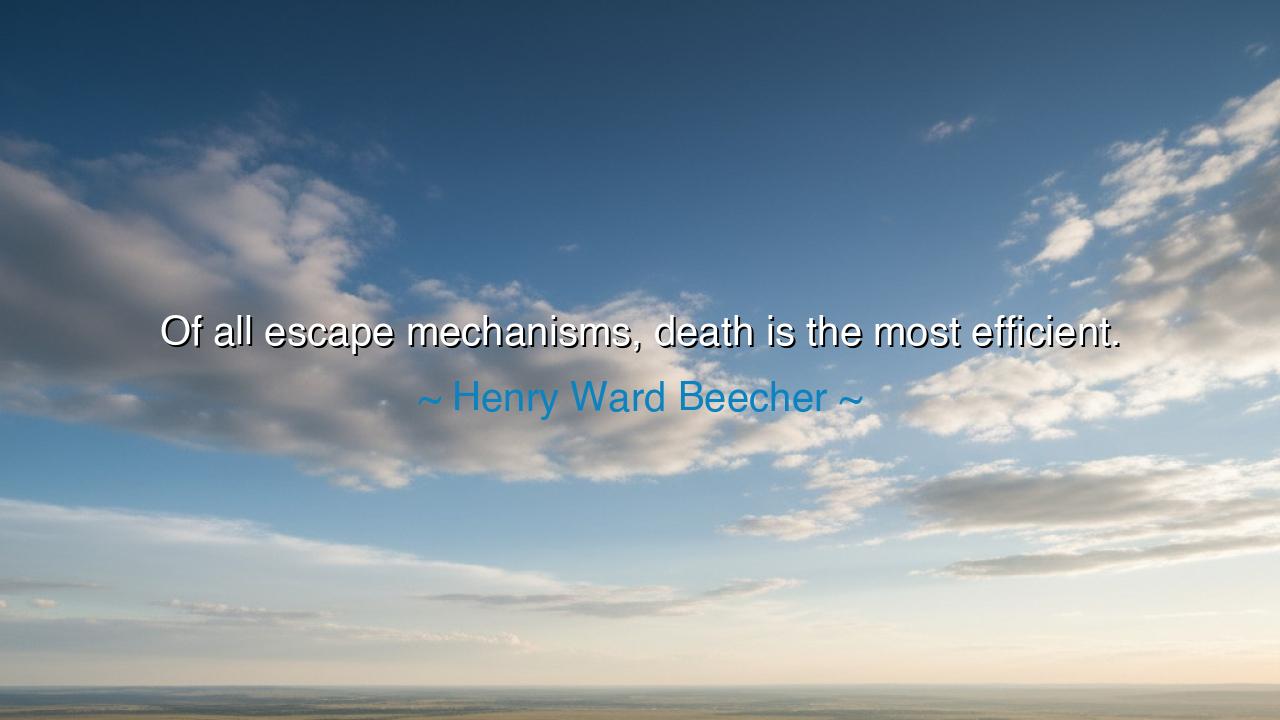
Of all escape mechanisms, death is the most efficient.






“Of all escape mechanisms, death is the most efficient.” Thus spoke Henry Ward Beecher, the fiery preacher and reformer of the nineteenth century, a man who knew both the depths of human sorrow and the reach of divine hope. His words are not a celebration of death, but a lament for the despair that leads souls to seek it. In this quote, Beecher recognizes a terrible paradox: that while death ends pain, it also ends possibility. It is the swiftest release from suffering—and for that very reason, it is the most tragic form of escape. For what it grants in peace, it steals in purpose; what it silences in torment, it silences also in hope.
Beecher lived in an age of turmoil. The world around him wrestled with slavery, war, and moral conflict. As a minister, he witnessed the weariness of hearts that could no longer bear their burdens—the poor crushed by poverty, the enslaved yearning for freedom, and the broken souls who sought release from their anguish through death. He understood that human beings, when pressed by grief and fear, seek refuge. Some turn to drink, some to distraction, some to forgetfulness. But the most final, the most absolute escape, is death itself. It ends all questions, all struggle, all memory—and therein lies its efficiency, and its danger.
To the ancient philosophers, this truth was not new. The Stoics, who prized reason above all, often debated whether death was a refuge for the wise or a coward’s retreat. Seneca, in his letters, wrote that one should be ready for death, but not seek it lightly. “Life,” he said, “is neither a good nor an evil; it is the theater in which good and evil are performed.” Beecher’s thought moves in the same current. He saw that to die is easy—to live rightly is the harder path. The efficiency of death tempts those who have forgotten that even suffering can bear fruit, that struggle itself refines the soul. The task, then, is not to flee from life’s pain, but to learn how to endure and transform it.
Consider the story of Abraham Lincoln, whose life was a long communion with sorrow. He faced the death of children, the scorn of enemies, and the horrors of a nation tearing itself apart. Many times he confessed to deep melancholy, what we would call despair. Yet he did not seek escape. He bore the weight of his anguish as one bears a cross, turning his pain into empathy and his loneliness into leadership. Had he yielded to despair, history would have lost one of its most luminous souls. Through Lincoln, we see the truth that Beecher’s quote conceals beneath its darkness: that though death is efficient, it is life’s inefficiency—its chaos, its striving, its ache—that gives rise to greatness.
Beecher’s words may sound somber, but they carry a hidden mercy. They acknowledge the reality of pain, refusing to disguise it with easy comforts. To name death as an escape is to honor the suffering that drives people toward it, while also mourning the loss of what could have been. For Beecher, who believed deeply in the divine spark within each person, death chosen too soon was a tragedy not because it ended breath, but because it ended becoming. The soul that flees before its time denies itself the chance to grow through the fire of endurance.
And yet, his insight is not a condemnation of the broken—it is a warning to the living. For every one of us carries the impulse to escape: from pain, from failure, from the terror of uncertainty. We run to distractions, to vices, to forgetfulness. But Beecher’s wisdom asks us to look deeper, to recognize that true escape is not found in endings, but in transformation. We must learn to sit with our sorrow, to wrestle with it as Jacob wrestled the angel, until from our pain we draw a blessing. For it is not by fleeing the darkness that we find light—it is by walking through it.
So remember this, my child: do not seek the most efficient escape. Seek instead the most courageous endurance. When despair whispers that death would be easier, answer that life, though heavy, still holds the power to create, to love, to change the world. Build your hope not upon the promise of ease, but upon the strength of persistence. For every dawn comes only after night, and every soul that endures its sorrow becomes a beacon to others still wandering in the dark. Beecher’s words are a mirror and a challenge: to see death’s seduction clearly, and yet to choose life—always, again, and again.






AAdministratorAdministrator
Welcome, honored guests. Please leave a comment, we will respond soon